 Why do bad things happen to good people is a question that invariably pops up when teaching those interested in Christianity. When hearing about the crucifixion, many will ask, Why
did Christ, the loving son of the Father, die on the cross? Isn't this
the koan we all must face in trying to answer their question? The recent
accidental death of a young man in a snowboarding accident raises the question in another context, but in this case, the accidental death of the young man may more easily help us see the mystery in a larger context.
Why do bad things happen to good people is a question that invariably pops up when teaching those interested in Christianity. When hearing about the crucifixion, many will ask, Why
did Christ, the loving son of the Father, die on the cross? Isn't this
the koan we all must face in trying to answer their question? The recent
accidental death of a young man in a snowboarding accident raises the question in another context, but in this case, the accidental death of the young man may more easily help us see the mystery in a larger context.
The story of the young man, only 21 years-old, was carried on the front page of both
Catholic papers. He
was a Sunday school teacher on an outing at a ski camp with altar boys from the
parish. After the accident, he was moved
to a hospital in Seoul and never recovered consciousness. His parents,
knowing their son's wish to be a religious, and his continued service to
others, decided to give his organs to others in need. He was talented,
playing the
guitar, drums and piano, and would teach how to play them without pay. He also served
as an accompanist for the children in the Sunday school program
The
doctors removed his heart, liver, pancreas, two kidneys, and the two corneas, all of which were to be given to patients who were waiting. Bones and skin were also taken. The mother said that the organ gifts of her son helped her to come to terms with his death, and to remember what her son was able to do for others.
The
story mentioned that Korea was still a country that finds it
difficult to donate body parts after death. Korea remains very low in
comparison to other countries who donate organs. The director of the
organ transplant center said that in the United States 35 out of
100 thousand donate organs; in Korea, only five out of 100 thousand donate. The director thanks the young man's parents and believes that the donation of their son's organs will help change the thinking of
many Koreans.
In
Korea, there are numerous patients who are waiting in hospitals for an
organ transplant. Since there are not enough organs donated, many will
die without the organ needed. The gift of one's organs is a wonderful,
selfless act of kindness, and hopefully Korea will be able to overcome some of the traditional
animosity that is associated with the donation of organs after death.
Cardinal
Kim donated his cornea, which made a difference in the numbers that
began giving but the numbers are still small and do not come close to
helping the thousands that are waiting for organs. The
editorial in the Catholic Times expressed the hope that the story of the young man will help to
renew the interest of the public in donating organs so that the many who are waiting with hope may finally have the opportunity of realizing that hope.
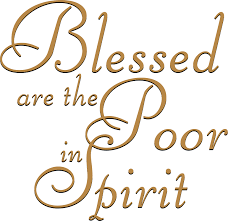
Koreans are very
generous people, and this is often seen within parishes by the way
priests are treated. Especially is this the case during Name Days (commemorating the feast day of the Saint whose baptismal name one has)
and the silver and golden anniversaries of ordination. The departures
and arrivals of priests, and their retirements are also often
commemorated with elaborate ceremonies that put a burden on the
parishioners. The Peace Weekly had an article on what a diocese in
Korea decided to do by simplifying and lessening the financial burden and the time spent by the parishioners with these ceremonies.
A priest from the diocese, at a meeting of all the priests of the diocese, said
that in this Year of Faith the priests first had to be evangelized and
renewed, and mentioned that he finds it embarrassing to see what many
have accepted as a gift at their retirement or at the anniversary of ordination. Because secular priests do not take the vow of poverty, accepting these gifts is considered permissible. However, the priest found
this to be not in keeping with their call as followers of Jesus. He
also mentioned that this was another example of authoritarianism in our
lives, which we have to work against. His talk was instrumental in getting the priests of the diocese to simplify and take away some of the burdens the Christians were experiencing.
Mentioned
also was the example of other priests who would leave their parishes on
their name days so as to dissuade the Christians from making the day
financially burdensome. The priest hopes that the steps taken in the
diocese will spread throughout the Korean Church.
The Koreans
are big-hearted people and show their appreciation to their priests for
their pastoral care. A woman leader in the diocese was quoted as saying
that for Koreans, good morals and manners require that we show
appreciation, but this has to be appropriate to the situation, she
said, to prevent criticism after the ceremonies are over.
This
article in the Peace Weekly received a big response. Some applauded
while others had some misgivings. On the open forum internet bulletin
board, many thought the Catholics, along with the
priests, would do well to live more simply. Some were concerned that the
Korean appreciation of morality and manners handed down over the
centuries will be lost.
There are probably no other national
communities that go all out for their priests as do the Korean
Catholics. The example of the diocese will certainly have repercussions
in other dioceses. There are those who have made efforts in the past to
change the customs that put a financial burden on the Christians. To
have these ideas appear during this Year of Faith, however,
is a good sign that the clergy is also looking for ways to live more in
harmony with the call they have received as disciples of Jesus.

Faith is joy. And a
gift from God, but we have to cultivate the gift. With these words,
the director of pastoral works for the diocese of Seoul speaks about
the Year of Faith in an interview with the Peace Weekly. The Weekly and
the diocese will try to make the Year of Faith one in which Catholics
will discover the joy of the Christian life and cultivate its growth.
The
director compared our faith life to a bicycle. We can carry the bike on
our shoulders, but that is difficult, or we can learn to ride the
bicycle which will give us great joy. The year of faith is not an event
but a way of deepening our roots. We have to respond to God's call. We
are happy when we meet someone we love, so it is with the God who loves
us, and with whom we continually have the opportunity to meet.
To
help us respond to God's call, the diocese has selected five key terms:
Word of God, Prayer, Church teaching, Mass, and Sharing love. To the
question how did the diocese decide to select these five terms, the
director explained by describing the current situation in the Korean
Church.
The crisis facing the Church is a weak understanding of faith life. Although many people still want to join the Church, many are
leaving. This is a sign to us that something is not well. That is why
we selected hearing the "word of God, prayer and listening to what the
Church teaches. The teaching of the Church, to a believer, is the will
of God attained with the help of the Holy Spirit. The Mass is our sign
of community and the call to
be one. Our life of faith is to bear fruit, which is the sharing of
love. St. Ignatius said that faith is the beginning, but the end is
love.
Why are we seeing this weakness in the basics of our faith life? asked
the interviewer. Prayer life is no longer important to many, replied
the director, and less than 10 percent study the
Scriptures. There are also the external elements in society that affect
us: good grades for children and the quest for money are becoming more
important than God. When money becomes an absolute, we have problems.
Furthermore, when I make myself the center, our faith is distorted, for
faith grows by relating with others.
To the interviewer's question whether we are going the way of Europe , the director answered that because of a growing secularization taking place in the world, we have to prevent this from happening here. When we accept the world's standard of judging, the Gospel message becomes weak. When we turn service to others into a search for glory, or stress the importance of money
and give pride of place to education, we are using worldly standards.
There are many who have entered our community, seen this attitude, and
have left, he said.
The director leaves us with the example of a butcher, Hwang Il Kwang Simon (1757-1802), living in a society that had little respect for the trade. Simon said that heaven is
in two places: the place you go after you die and the place you create
here on earth. The way the upper classes treated him, a member of the
lower class, made him feel that he was in heaven. This, the director
says, is what a Christian should be doing in every encounter with
anyone.
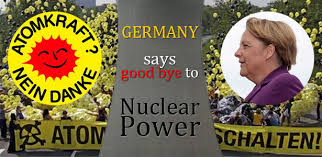 During the Second World War Germany and Japan were responsible for
many atrocities. At the end of the war, many of their military commanders were convicted of war
crimes. The culture of life columnist of the Peace Weekly reminds us
how their countries responded to these accusations.
During the Second World War Germany and Japan were responsible for
many atrocities. At the end of the war, many of their military commanders were convicted of war
crimes. The culture of life columnist of the Peace Weekly reminds us
how their countries responded to these accusations.
Germany did
many times formally apologize for the crimes of the Nazi era. Whether
they were truly sorry for what happened, or thought they were the acts of
a few Germans and apologized to help themselves join the nations of
Europe and help their economic recovery, we will never know but the fact
is that the government acknowledged guilt and has even up to the
present time given compensation.
Japan was different. They
have not honestly acknowledged their crimes, or earnestly asked for
forgiveness, nor adequately given compensation, says the columnist. And they continue to advance their military power.
This
difference between the two former axis powers can also be seen in the
atomic field. After the war, Japan worked to develop their atomic
energy. It has
progressed to where it now only trails the US, Russia, England and
France in the use of atomic energy.
Japan has 57 nuclear plants, is building 3, and plans 11 more. At present, 30 percent of the electrical needs of the country is produced by nuclear energy.
Germany, after the war, also began to develop her
economy around nuclear energy. However, after the 1986 Chernobyl
disaster in Russia, doubts arose among many Germans concerning the safety of their own nuclear energy facilities. In 1998 the Green Party, in
alliance with the Democratic Party, decided to end the country's reliance
on nuclear power. They determined not to build anymore nuclear plants,
and the existing plants, when needing repairs, would be
shut down. The country that was the leader in the world of nuclear
power willingly gave it up.
As a replacement, they have decided to develop sun
power, wind and bio-renewable-energy sources. With the change of
government, there was a period of hesitancy, but with the disaster in Japan, they
have made the year 2022 the year to cease using all nuclear power. And their citizens are
willing to make the sacrifice by cutting back on the use of electrical energy and
are willing to pay more taxes to see a future reality of non-nuclear energy sources.
The
columnist would like to see Korea follow suit. Korea is listed as the
fifth biggest user of nuclear energy and has plans to build two more
nuclear plants. She hopes that Korea will follow Germany in
developing renewable sources of energy, working with sun, wind and bio
to prepare a better tomorrow for future generations.
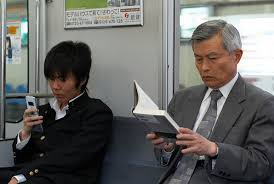
Korean
media gave a lot of space to the fact that almost 90 percent of those
over fifty voted in the presidential election, and were considered by
many to be the reason the first female president of the country was
elected. On the open forum page of the Catholic Times, a Jesuit
professor at Sogang University reflects on what this means for our
country.
The media did consider the difference between the young and the older generation in this election. The older voters experienced the Korean War, seen the industrialization of the country, and had been leaders
in the democratization of the country. They took care of their parents
but did not expect the same from their children. They were concerned
about their old age and tended to be progressives; they now want security.
The professor believes there is a difference in thinking and sensitivity between the generation of the 20s
and 30s, and the over 50's. A gap between
the young and the old is not new. However, Korea is becoming
older, the government can't help but be concerned about those who voted
for them. The difference in the voting by the young and the old has to
be remembered for the future of the country. A great number of the
voters are over fifty, and that means that the future of the country,
which shortly will be in the hands of the young, will be the ones who will have to
deal with the results of what the older think important now.
There
is also a difference in the sensitivity to our problems felt by the old
and the young. The interest that the young have about environmental
problems and employment is not the same as it is for the older
generation. The young, from the time they were children, have been
hearing about global warming, while the older generation has an interest
in development and industrialization and less concern about the environment.
The young are concerned with employment while the older generation is concerned with the
industrialization of the country. They had no difficulty in accepting
the blue-collar and the white-collar difference in society. However,
over half of those in their twenties are either in college or are
graduates who have to consider that half of them will face the
possibility of being a non-regular worker. The older generation has
difficulty in understanding what this highly educated, young generation
feels about the future. The older generation tends to feel that the
young are lazy and want to avoid the difficult jobs in society, while looking for the easy life.
Without understanding the sensibilities of the young, the professor says
we will continue to look back to the past and fail to see the future.
We will continue to push the interest of the young into the background
and just be concerned with the issues of the elders in society. This
means not only that there will be a generation gap but that the young peoples' rights will be exploited.
The professor recalls that
Jesus began his public life when young. "He is not yet fifty" was heard
by Jesus. The ones who followed our Lord were the young. With these
young people, he changed the world. The world of the young is the world
of the future. A society able to see the joy, hope, tears and
frustrations of the young will be a society with hope. What the society
of today needs is the wisdom and sensitivity to be concerned for the younger generation.
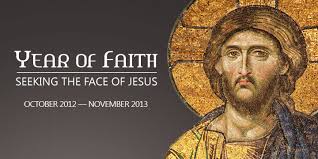
In Korea where guns
are not permitted, the shooting incidents in the States remain a
mystery to many. The desk columnist of the
Catholic Times discusses the problem within the context of our own
culture.
He
mentions that in the States many people want to limit the selling of
firearms while others want the right to buy them without restrictive
laws curtailing what they believe is their constitutional right to do
so. Because of the possible enactment of measures controlling gun
purchases, there is now a hoarding of firearms and ammunition, with many
dealers saying they can't keep up with the demand. All this happening
despite the recent shooting deaths of 20 children while attending kindergarten class. He
attributes this to the western frontier mentality of many Americans who feel a need
to possess weapons. He also
acknowledges that many citizens are influenced by the gun lobby: the
politics of money. Even though the majority of the people, according to the latest polls, are for a
change in the possession of guns, he believes the influential sectors of society will
militate against change.
The columnist refers to the book Who Rules America?
by William Domhoff as representative of the thinking of many that the
wealthy and the powerful
are in control. To protect their interests, Domhoff says they have
easier access to the most current information coming from research
centers, foundations, and ad hoc commissions, and from insider
information from international big
business sources, among others. This is
not done in any covert way but is legal and easily seen.
No
matter how certain segments of society feel about this state of
affairs, the privileged groups within society will have control,
according to Domhoff, and the hope for change is
minimal.
In Korea we also have certain things that will
not change. Still very much in evidence are the old regional
differences, the bonds of political and economic friendships among the
elite classes,
the preeminent place and concessions given to the conglomerates in our
economic structure, a general unconcern of the government with the
common people, and at times the unmerciful unconcern of the most vulnerable in our society. Overall, there is
seen a lack of will by our lawmakers to change in any meaningful way the
status quo.
What about our
religious life? he asks. Looking at his own life, he admits that if he has no personal experience of the truth of what he is asked to believe,
or has not seen sufficient scientific evidence for its truth, then the
difficulty of giving wholehearted response keeps
appearing. Along with this, he believes our mental laziness often
prevents us from participating with enthusiasm when we do believe.
What
do we understand by community? As Catholics, we believe, he says, that
we are a community that has been saved, and yet remain passive, without a
sense of meaning, looking for consolation and a faith life that seeks
to evade its requirements. We bury out of sight our Christian vision of
life. And our clergy often finds it difficult to adapt to the times,
holding on to a form of clericalism. More so than at any time in the
past, the columnist believes that Catholicism in Korea is in need of
reform, renewal and repentance.
Will this be more difficult to
accomplish for the Church in Korea, or easier, than it will be for the
States to do something about ending gun violence? It may depend, he
says, on how serious we are about this year of faith that we are in the
process
of living?
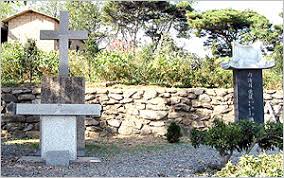
A columnist writing on spirituality for the Catholic
Times recalls a trip to a pilgrimage site commemorating Korean martyrs.
While there, he stayed at an overnight lodge and met
by chance a priest who was in the seminary with him. He was now the pastor of the parish where the pilgrimage site is located.
As
the pastor of a parish that went back to the time of the martyrs, he
became interested in the history of the early Church, and became interesting in the life story of the martyr Yi Joon-chang Ludovico (1759-1801).
Ludovico was a bright, talented person, which helped prepare him for the difficult times he would soon confront as a missioner
to his own people in the Chungnam province. At this time, the Catholics
didn't understand all the discipline and structural realities of the
Church and picked their own priests to minister to them. Ludovico was chosen as the priest for the community, and due
to his efforts the community grew to over 300 members. It was from this
community that years later the first two Korean priests and many other
Christians would trace their roots.
During that time no other area embraced Catholicism the way Chungnam did. The parish grew so rapidly that Ludovico saw the need for priests and worked to have a priest come in from China. During the persecution of Catholics in 1791, Ludovico was picked up by the authorities, denied his faith, and was released. He returned to his hometown but was persuaded to move because of his continued work with the Christians, and because the danger of being reported was always present.
Bishop Daveluy was quoted as saying the apostasy of Ludovico was a great sadness and embarrassment to the Catholic community. His parish did grow to over 300 members in a short time under his leadership, and, in a very worldly way, he may have thought they needed him, and denied his faith to be with them.
Ludovico
later was sorry for his denial, and
again professing his faith, he
continued his teaching and missionary work. In 1801, he was again
arrested and killed by beheading. The pastor used the story of Ludovico
to address the serious problem today of many lax Catholics and those who have left the community
of faith entirely.
The pastor thinks the
Church should not only study effective ways of increasing the numbers of Christians but also
how to invite back those who for one reason or another have decided
to leave the Church.
The words of the pastor made him think about the recent emphasis on the new evangelization. Not only do we have to continue our work of evangelization, as in the past, but at the same time look for ways to invite back to the community those who have left. Doing this earnestly will be a good example to those who have left, he said, but cautioned that we should not expect quick results.